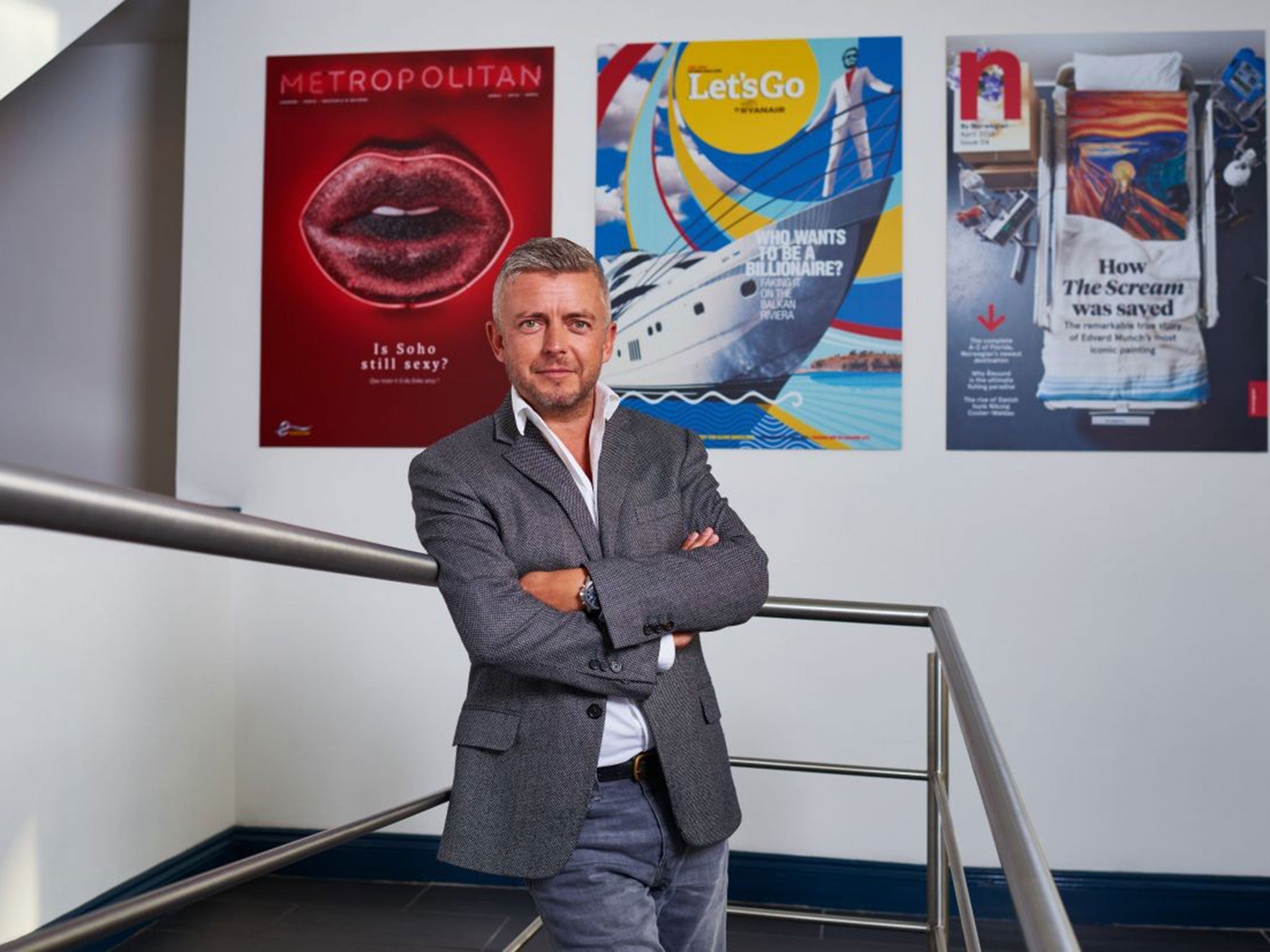Ink global has used savvy marketing and a globe-trotting readership to take over the world’s skies
Founder Michael Keating talks about the success behind the London-based company

Michael Keating has a captive audience, and he’s got a theory about it: “Readers are in a different state of mind at 35,000ft. They might have had a glass of wine and they’re almost cocooned – so their relationship with media is more intimate and less rushed.”
Keating, along with business partner Simon Leslie, has built the London-based Ink Global into the biggest travel media company in the world. As of this morning, it serves 34 international air carriers, from United Airlines to easyJet, and employs 420 people to create more than 100 media products for an annual audience of 670 million passengers.
It has achieved this from remarkably humble beginnings. Not so long ago, Keating was working as a researcher on the ITV regional news show London Tonight. These days, his feet barely touch the ground as he flies to meetings with clients and visits Ink’s other staff hubs in New York and Atlanta. It gives him a chance to see how the company’s content is being consumed.
This is a pivotal moment for Ink as it tries to exert competitive advantage over rival publishers who still see in-flight media as an analogue experience; the glossy magazine in the string basket attached to the seat in front.
Ink’s in-flight media starts from the moment you make an online reservation. “You can segment every passenger by gender, age, origination airport and destination, class of travel and frequent-flyer status,” he says of this anonymous data capture operation. To Keating, the printed-out boarding pass is a piece of prime advertising inventory. “Dad might get a car-park offer for Gatwick, Mum might get an Estée Lauder skincare offer she can redeem in the airport shops, and the kids might get entertainment attractions for the destination.”
Ink’s targeted advertising system, alongside a digital approach that has turned much-loved travel features from in-flight glossies into interactive apps for mobile, is winning it new business. American Airlines, after 40 years of doing its media in-house, has called in Ink to relaunch its three titles, including American Way, which has an annual readership of 193 million. And Iberia has ditched its Spanish publisher after 32 years and asked the British company to redesign its titles Ronda and Excelente for the digital era.
Some readers might not like the idea that they are being advertised to from the moment they make a booking but Keating claims that, along with Ink’s digital content, the connectivity enhances “the travel experience”. It also makes money “that didn’t exist” for the carriers. “We plug it in … and it generates hundreds of thousands or millions of extra revenue, depending on the size of the airline.”
Ink was set up 20 years ago in unusual circumstances. Keating was sent to Lebanon by ITV to make a news feature about tourists taking cheap package holidays to war-torn Beirut. He met an air-travel entrepreneur who asked him to do the in-flight literature for British Mediterranean Airways, which had one aircraft and one route. Keating took the job, but carried on working in television.
The small contract helped him to win a couple of others and led to the “pivotal moment” when Stelios Haji-Ioannou gave Ink the easyJet media business at a time when it was locked in a price battle with British Airways. The major deal coincided with the 2001 attack on the twin towers. Keating feared the worst but, while people feared flying to America, travel to Europe grew and Traveller, Ink’s magazine for easyJet, grew with it.
You might think that producing so many airline magazines offers opportunities for economies of scale and sharing content. But Keating says this doesn’t happen. “Each magazine has dedicated editorial and sales teams. There is no shared content and everything is 100 per cent commissioned bespoke for that magazine.”
Getting premium content for magazines such as United Airlines’ premium-cabins title Rhapsody isn’t a problem. Robert De Niro was a recent cover star, and Hollywood publicists know the value of the UA captive business-class audience. Keating admits that, when it comes to editorial interviews, he is “not in the business of hatchet jobs”.
United’s magazine Hemispheres is available as a PDF-style tablet app. And its 30-year old signature feature, “Three Perfect Days”, has been repurposed by Ink as a mobile app for visiting the sights. Then again, Ink favours a “take it with you” message on its print publications. Passengers market the airline by carrying its magazine, although Keating admits he would be “in trouble if everyone took one”.
Ink is expanding by hiring top talent from the technology and publishing sectors. Chief technology officer Chee Wong previously held a similar role at music identification service Shazam. He has designed an entire booking app – from searching flights to car parking – for Jetstar (the Qantas low-cost airline), which Ink hopes will set a new standard. Keating sees potential for new features, such as ordering in-flight meals in advance.
Andy Cowles, formerly with Rolling Stone magazine, is the new London-based editorial director and Ink will hire 40 staff for the revamp of the American Airlines portfolio.
Ink is an outstanding British media success story. “We are biggest, by the number of airlines we deal with, the number of passengers they have or by the advertising revenue we make,” says Keating with his Northern Irish lilt. “Whichever way you cut it, we’re the biggest in the world in the in-flight space.”
Join our commenting forum
Join thought-provoking conversations, follow other Independent readers and see their replies
Comments
Bookmark popover
Removed from bookmarks